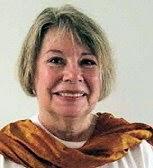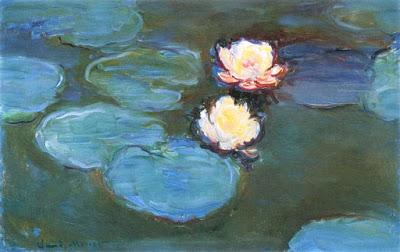by Nina
Water Lilies by Claude Monet
Nina: Before we begin, can you tell us a bit about yourself, both as a psychoanalyst and as a yoga therapist.
Lynn: I found yoga many years ago when I was in high school. I came across a book that had a powerful and unusual portrait of a man’s face. The book was called “Yoga.” I had never heard of yoga, and I was curious. Maybe the book was written by Sri Krishnamacharya, but I’m not sure.I was curious and so I took the book home and tried to copy the photos of the different asanas. I was a kid, and I liked what I called “rocking horse” (Bow pose) best. It turns out that Bow pose helps dissipate anxiety, but who knew? I just liked it. Year later I began attending the Integral Yoga Institute on 13th Street and learned lots more about it.About 15 years later I was in a bad marriage. My husband at that time and I were not able to form a team. We had a little kid, and I knew that I had to take my son and leave that marriage to survive. I asked myself, how could such a smart girl wind up in such a terrible place? I decided to begin psychoanalysis and find out. The psychoanalytic institute I attended turned out to be just a few blocks away from IYI.I was lucky. Two lifesavers.Eventually I opened my psychoanalytic practice. Some of the people I worked with could clearly benefit from breath work, and I decided to add that into my practice. This was unusual at the time.I had firsthand evidence that psychoanalysis and yoga work together in a powerful synergy. I studied psychoanalysis at the National Psychoanalytic Institute for Psychoanalysis, and I took classes at IYI. I pause here to honor all my teachers.
Nina: From your perspective, what is anxiety and what causes it?
Lynn: Anxiety is the overwhelming fear that something terrible is going to happen or is happening already. An anxious person feels that they can barely stop themselves from falling apart. The pressure from environmental issues, such as financial problems, relationships, work, or school can cause people to feel horribly anxious. In my case, I was predisposed to anxiety because of a difficult family of origin. Then, when I divorced and was solely responsible for raising my child, working, etc., I was pushed close to the edge. I worked hard, and that burned up a lot of energy physically, but I was also chronically overstimulated.
Nina: Do people tend to experience more anxiety in times of change? If so, why? And are you finding levels of anxiety to be particularly high for people dealing with the COVID-19 pandemic?Lynn: Change makes people anxious. You like to know what happens next, and, guess what? You don’t. COVID -19 is a pernicious virus that you can’t see, hear, smell, or taste. The entire environment becomes threatening, and there’s not much you can do about it. It’s an invisible evil, like something in a horror movie. Your body will be penetrated by an unseen unknown entity that might kill you.
Nina: What are some of the specific symptoms associated with anxiety?
Lynn: Many people experience jumpiness or hypervigilance, restlessness, sweatiness, the inability to concentrate, racing thoughts, unwanted thoughts, or fatigue. Many people today, in the midst of this pandemic, complain of how tired they’re feeling. Of course, we’re tired; we’re under continual attack. We’re scared we’re going to get killed.
Nina: In general, how can yoga help people with anxiety?Lynn: Yoga teaches you to know your body, to be inside it and to observe how you feel. You learn to pay attention to your breath. Or, you may find yourself disconnected and bound up in a whirlwind of unpleasant thoughts and yoga helps ground you. Or, you feel your body in tension and learn how to relax each body part one by one, and your body lets go.Nina: What are some specific yoga practices and/or poses that you recommend or suggest for anxiety?Lynn: First find your place. Feel your feet on the ground, your body in space. Start watching your breath, and slowly smooth it. You might try the three-part breath, or Deerga Swassam, an Integral Yoga favorite. Calling on your senses, one by one, can help. Ask yourself what you see, what you hear, feel, smell, etc.Yoga nidra, or yogic sleep, can be calming.In addition, there are a whole range of restorative yoga techniques that release the bound-up energy in your body. If you find yourself scared in the morning when you wake up, or scared when you’re going to sleep, try yoga nidra. There are many resources on the Internet that will lead you through a practice.Nina: Are there any yoga practices and/or poses that people experiencing anxiety should avoid?Lynn: Often people ask me if they should start a meditation practice. Meditation is calming, but starting a practice on your own, especially when you’re feeling anxious, is a bad idea. It can make you feel worse. Find yourself a teacher.Power yoga can be dangerous if you get swept up in a fast, difficult routine. You might wind yourself up instead of down, and you could get hurt.
Nina: When should someone who anxious seek professional help?Lynn: If feeling anxious lasts more than a few days, if it feels like your baseline after a few weeks, then it's time for you to consult with a mental health worker, perhaps a therapist or psychiatrist.
Nina: Is there anything else you’d like to say to our readers about this topic?
Lynn: Take it as slow as you can, and revel in every moment.


